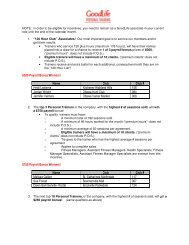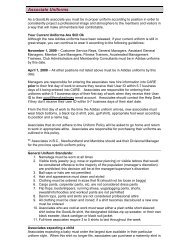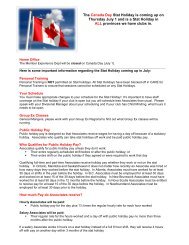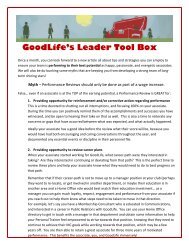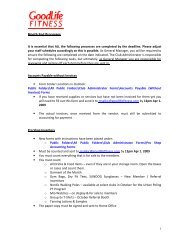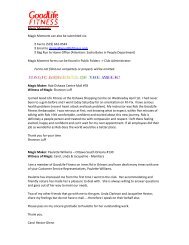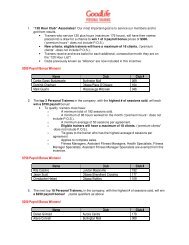Updated Policy and Procedure Handbook - GoodLife Fitness
Updated Policy and Procedure Handbook - GoodLife Fitness
Updated Policy and Procedure Handbook - GoodLife Fitness
- No tags were found...
You also want an ePaper? Increase the reach of your titles
YUMPU automatically turns print PDFs into web optimized ePapers that Google loves.
mother, plus 35 weeks of parental leave for the birth mother, plus 37 weeks of parentalleave for the other parent). Parents may also choose to go on leave at the same time: forexample, a father could take parental leave at the same time a mother is on pregnancy orparental leave.Can an employer fire an employee for taking leave? No. An employer cannot fire orotherwise penalize an employee in any way because he or she is or will become eligible totake, plans to take or takes a pregnancy or parental leave.What happens to an employee's pay, seniority <strong>and</strong> benefits? Employers do not haveto pay wages when an employee is on pregnancy or parental leave. Employees earnseniority <strong>and</strong> credit for length of service <strong>and</strong> length of employment while on pregnancy orparental leave. While an employee is on pregnancy or parental leave, the employer mustcontinue to pay its share of the premiums to certain benefit plans (i.e., pension plans, life<strong>and</strong> extended health insurance plans, accidental death plans <strong>and</strong> dental plans) that wereoffered before the leave.Can an employer require an employee to return early from leave? No, an employercannot require an employee to return from leave early.What happens when an employee returns to work? In most cases, an employee mustbe given his or her old job back at the end of his or her pregnancy or parental leave, or acomparable job if that job no longer exists. In either case, the employee must be paid atleast as much as he or she was earning before the leave. Also, if the wages for the jobwent up while the employee was on leave, or would have gone up if he or she hadn't beenon leave, the employer must pay the higher wage. The only time the employer doesn'thave to reinstate the employee is if he or she is dismissed for legitimate reasons that aretotally unrelated to the leave.What if an employee decides not to return to work after pregnancy or parentalleave? If an employee on pregnancy or parental leave decides to resign before he or shereturns to work, he or she must give at least four weeks' written notice to his or heremployer. This notice requirement doesn't apply if the employer constructively dismissesthe employee. See the "Termination of Employment" fact sheet for information onconstructive dismissal.Who can take pregnancy leave? A pregnant employee is entitled to pregnancy leavewhether she is a full-time, part-time, permanent or contract employee, provided that she:Works for an employer that is covered by the ESA , <strong>and</strong> Was hired at least 13 weeksbefore the baby's expected birth date (the "due date").Can an employee who just started a new job take pregnancy leave? To be eligible forpregnancy leave, an employee has to be hired at least 13 weeks before the date the babyis due, or expected to be born--not the date the baby is actually born. An employeedoesn't have to actively work for 13 weeks to be eligible for pregnancy leave. Theemployee could be on layoff, vacation, sick leave or have started pregnancy leave in the13-week period before the due date, <strong>and</strong> still be entitled to her pregnancy leave.What if the baby is born before the employee is 13 weeks in the new job? Eligibilityfor pregnancy leave does not change because the baby was born early (i.e., before thedue date) because it depends on the date the baby is expected to be born-not on the dayit actually is born.Does an employee who has a stillbirth or miscarriage still qualify for pregnancyleave? If an employee has a miscarriage or stillbirth, she is eligible for pregnancy leave solong as the miscarriage or stillbirth occurred no more than 17 weeks before the due date.How long does a pregnancy leave last? Most pregnant employees have the right to takeup to 17 weeks of unpaid time off work. Employees may also choose to take less time off.Confidential <strong>and</strong> Proprietary Information of <strong>GoodLife</strong> <strong>Fitness</strong> Clubs | V16 October 2009 54





